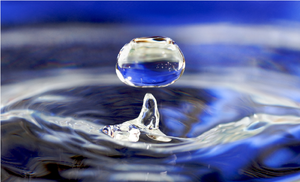Contents
Key Stage 1
Meaning
Water is a transparent liquid needed by all life on Earth.
About Water
- Water is can be used to wash clothes because it is a liquid.
- Water flows down rivers and into the sea because it is a liquid.
- If water gets too hot it turns into steam.
- If water gets too cold it becomes ice.
Key Stage 2
Meaning
Water is a transparent liquid needed by all life on Earth.
About Water
- Water can be frozen into ice if it is cooled down below 0°C.
- Water evaporates into water vapour.
- The higher the temperature the quicker water evaporates.
- At 100°C water boils and turns into steam.
Key Stage 3
Meaning
Water is a liquid (at room temperature) chemical compound with the chemical formula H2O.
About Water
- Water can be frozen into ice if it is cooled down below 0°C.
- Water evaporates into water vapour.
- The higher the temperature the quicker water evaporates.
- At 100°C water boils and turns into steam.
- Water reacts with metals above Hydrogen on the reactivity series to produce Metal Hydroxides which are alkaline.
Key Stage 4
Meaning
Water is a liquid (at room temperature) chemical compound with the chemical formula H2O.
About Water
- Water can be frozen into ice if it is cooled down below 0°C.
- Water evaporates into water vapour.
- The higher the temperature the quicker water evaporates.
- At 100°C water boils and turns into steam.
- Water reacts with metals above Hydrogen on the reactivity series to produce Metal Hydroxides which are alkaline.
References
AQA
- Water, page 85, GCSE Physics; Third Edition, Oxford University Press, AQA
- Water, pages 262-3, GCSE Biology, Hodder, AQA
- Water, pages 44-45, GCSE Chemistry; Third Edition, Oxford University Press, AQA
- Water, pages 59, 64-5, 72, 99, GCSE Chemistry; Student Book, Collins, AQA
Edexcel
- Water; distillation, pages 10, 14, GCSE Chemistry, Pearson, Edexcel
- Water; for chemical analysis, page 14, GCSE Chemistry, Pearson, Edexcel
- Water; for drinking, pages 14-15, GCSE Chemistry, Pearson, Edexcel
OCR
- Water treatment, page 148, Gateway GCSE Combined Science; The Revision Guide, CGP, OCR
- Water; ‘Heavy matter’, pages 171, Gateway GCSE Physics, Oxford, OCR
- Water; balance/regulation, pages 120-121, Gateway GCSE Biology, Oxford, OCR
- Water; body requirements, page 124, Gateway GCSE Biology, Oxford, OCR
- Water; boiling point, pages 10-11, Gateway GCSE Biology, Oxford, OCR
- Water; Boiling point, pages 10-11, Gateway GCSE Physics, Oxford, OCR
- Water; Changes of state, pages 30-31, Gateway GCSE Physics, Oxford, OCR
- Water; corrosion of metals, pages 216-219, Gateway GCSE Chemistry, Oxford, OCR
- Water; distillation, pages 270-271, Gateway GCSE Chemistry, Oxford, OCR
- Water; electrolysis, page 124, Gateway GCSE Chemistry, Oxford, OCR
- Water; Freezing of, pages 6-7, Gateway GCSE Physics, Oxford, OCR
- Water; Liquid pressure, pages 40, Gateway GCSE Physics, Oxford, OCR
- Water; pollution, page 191, Gateway GCSE Biology, Oxford, OCR
- Water; purification, pages 44, 258-259, 270-271, Gateway GCSE Chemistry, Oxford, OCR
- Water; reaction with metals, pages 132, 133, 141, 142, Gateway GCSE Chemistry, Oxford, OCR
- Water; Rockets, pages 36, Gateway GCSE Physics, Oxford, OCR
- Water; Specific heat capacity, pages 28-29, Gateway GCSE Physics, Oxford, OCR
- Water; Specific latent heat, pages 31, Gateway GCSE Physics, Oxford, OCR
- Water; treatment for drinking, pages 258-259, Gateway GCSE Chemistry, Oxford, OCR
- Water; vapour, page 44, Gateway GCSE Chemistry, Oxford, OCR
